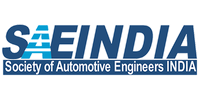Event Details
Abstract:
Indian Automotive Sector is of paramount importance to the Nation's Economy, as its contribution to the Nation's GDP is 6.4%. It, directly and indirectly, employs 8 million people. Diesel power train plays an important part in the Automotive / Off-Highway industry segment. After the successful implementation of BSVI – Phase 1 in April 2020, OEMs are ready to comply with BSVI-Phase 2 Norms & OBDII implementation. This brings several technical challenges in the real emission driving cycle, OBDII stringent norms & complex after-treatment systems. Fuel economy norms are going to become mandatory in the near future, together with emission norms. After the European commission's release of the EURO VII proposal on 9th November, European auto majors are already moving towards cost-effective & technically feasible solutions to comply with complex EURO VII requirements in terms of enlarged ride test conditions, including enhanced durability requirements. For decarbonizing road transport to help achieve climate neutrality by 2050., CO2 targets for 2030 & beyond will be more stringent, requiring increased sales of New Zero-Emission Vehicles. This will also require major investment in Engine Development and Technology change from the existing Hardware of the Engine and EATS. Technology upgradation for EURO VII in the future will need to evolve innovative Engine Combustion, After Treatment, and control area developments. The focus of thermal efficiency improvement for better fuel economy continues to be a significant challenge, especially with the concurrent tightening of emission regulations.
In this session, we will cover salient features of EURO VII (Passenger Car and Commercial Vehicle) regulation and solutions to meet EURO VII and fuel economy standards, such as CAFE. BSVI - Phase 2 challenges will also be discussed in detail. Role of alternative fuel VIS A VIS current Diesel / Gasoline power units will be covered extensively, with respect to technology upgradation required for alternate fuel vehicles. Genset Emission CPCB4+ norms to be effective from July 2024, point to big migration from mechanical to common rail system platform design. Off-Highway and Tractor engine challenges to meet TREM IV / TREM V, and CPCB4+ is another domain to be covered. The Hydrogen IC engine concept strategy for automotive engines, will also be introduced as a promising, futuristic thrust area.
Key Discussion Areas:
- BSVI Phase 2 – Regulation and Field Challenges
- Euro VII Regulation and After Treatment Technology, to meet Euro VII
- TREMIV / TREMV / CEV / CPCB 4+ for Tractor / Construction Equipment Vehicles (CEV)
- Future Alternate Fuel and Technologies
- Hydrogen Engine Development for Passenger Cars and Commercial Vehicles
- TREM V
- H2 ICE
Who should attend:
- R&D Engineers / Managers / Heads
- Design Engineers / Managers / Heads
- Product Development Engineers / Managers / Heads
- Quality Engineers / Managers / Heads
- Equipment manufacturers, service providers
- Industry professionals (Auto, A&D, high-tech, consumer appliances, energy, industrial)
- Startups, Academia
Event Details
Speaker

Dr. Jyotirmoy Barman
General Manager at Simpson & Engine Company Limited
- MK
Mr. Neeraj Ketkar
Lead DIESEL, CNG, H2 Powertrain & Exhaust After-Treatment Development at AVL
- AS
Ajeet Sharma
PTE Calibration at AVL
